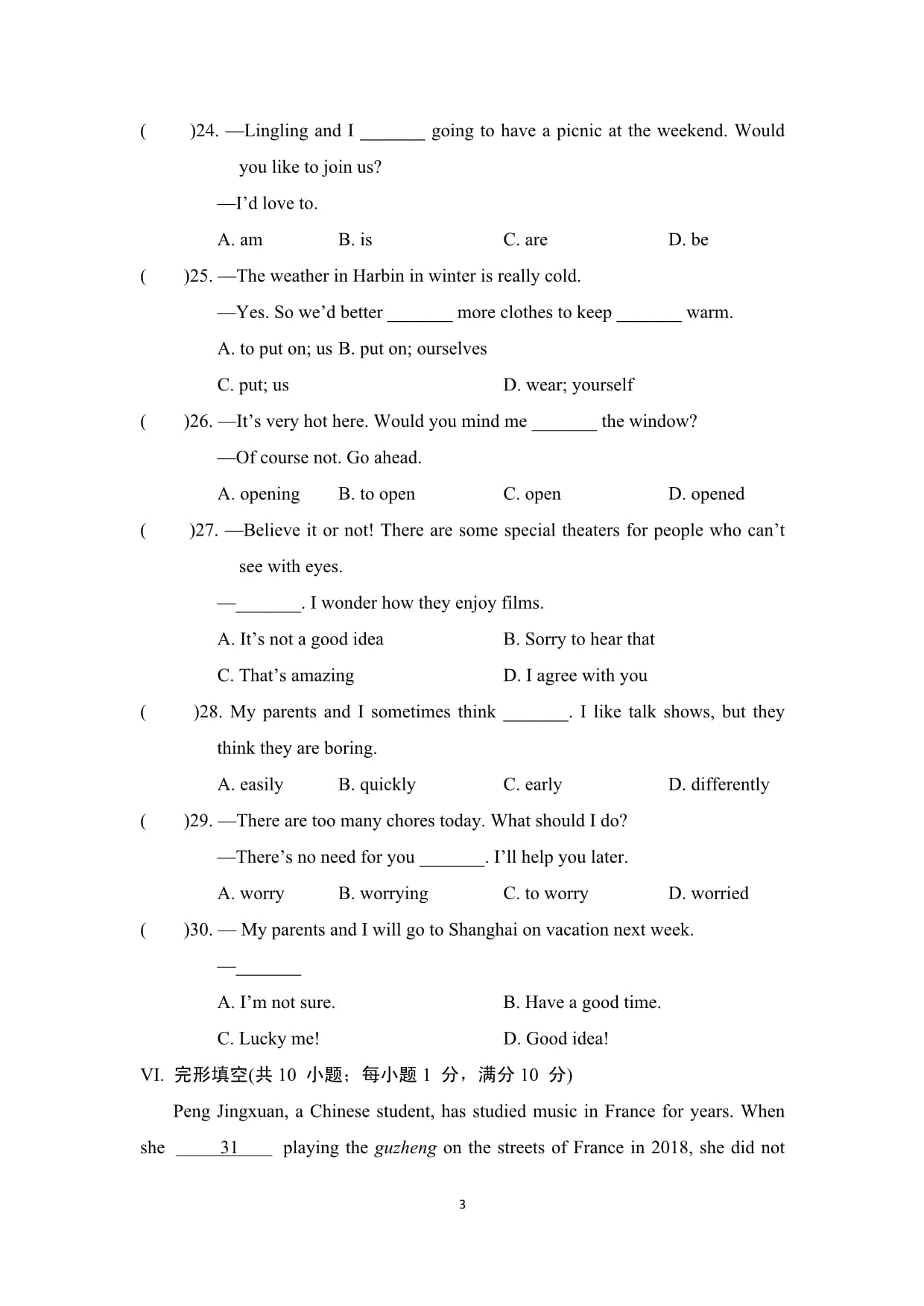




版权说明:本文档由用户提供并上传,收益归属内容提供方,若内容存在侵权,请进行举报或认领
文档简介
2024新版外研版七年级英语上册期末测试题及答案限时:120分钟满分:120分第一部分听力(共四大题,满分20分)I.短对话理解(共5小题;每小题1分,满分5分)()1.Whatistheboygoingtowearonthefirstschoolday? A. B. C.()2.WhatdoesLilyalwaysdo? A. B. C.()3.What’stheboygoingtodothisweekend? A.Gotothezoo. B.Haveapicnic. C.Gohiking.()4.Whenwilltheymeet? A.At6:45. B.At7:00. C.At7:15.()5.Whenwilltheytalkabouttomorrow’splan? A.Beforedinner. B.Duringdinner. C.Afterdinner.II.长对话理解(共5小题;每小题1分,满分5分)听下面一段对话,回答第6、7题。()6.What’sthenameofthegirlinthephoto? A.Alice. B.Gina. C.Mary.()7.Whoarethesetwoboys? A.They’reGina’sbrothers. B.They’reGina’scousins. C.They’reAlice’sbrothers.听下面一段对话,回答第8至10题。()8.Whatarethetwospeakerstalkingabout? A.Chinesepaper-cutting. B.Flowers. C.Chinesehistory.()9.Whatisitmadeof? A.Animals. B.Redpaper. C.Pictures.()10.Wherearetheyput? A.Inthebox. B.Inthesky. C.Onthewindows.III.短文理解(共5小题;每小题1分,满分5分)()11.WhatfestivalareLiFang’sfamilycelebratinginthephoto? A.Christmas. B.TheSpringFestival. C.TheLanternFestival.()12.WhereareLiFang’sfamilyhavingdinner? A.Athome. B.Inahotel. C.Inarestaurant.()13.WhatisLiFang’scousinLiYidoinginthephoto? A.Eatingjiaozi. B.Eatingfish. C.Drinkingcola.()14.WhereisLiFanginthephoto? A.Nexttoherparents. B.Onhergrandparents’right. C.Infrontofherparents.()15.Whoistakingthephoto? A.LiFang. B.LiFang’sfather. C.LiYi’sfather.IV.信息转换(共5小题;每小题1分,满分5分)WhoWhatdoesheorsheliketodo?Whatdoesheorshethinkofit?AnnaPlaythe16.________NoteasyDavePlaythe17.________18.________andeasySallyPlant19.________VeryrelaxingJimmyPlaysoccerReally20.________第二部分语言知识运用(共三大题,满分30分)V.单项选择(共10小题;每小题1分,满分10分)()21.Ifyouwanttobeagoodbasketballplayer,youneedalotof_______. A.practice B.friends C.players D.play()22.Doyouknowwhichofthetoyrabbitsonthedeskis_______? A.she B.he C.hers D.herself()23.Mostplantscannotgrow_____sunshine.Mostanimalsalsoneedsunshine. A.within B.without C.in D.under()24.—LinglingandI_______goingtohaveapicnicattheweekend.Wouldyouliketojoinus? —I’dloveto. A.am B.is C.are D.be()25.—TheweatherinHarbininwinterisreallycold. —Yes.Sowe’dbetter_______moreclothestokeep_______warm. A.toputon;us B.puton;ourselves C.put;us D.wear;yourself()26.—It’sveryhothere.Wouldyoumindme_______thewindow? —Ofcoursenot.Goahead. A.opening B.toopen C.open D.opened()27.—Believeitornot!Therearesomespecialtheatersforpeoplewhocan’tseewitheyes. —_______.Iwonderhowtheyenjoyfilms. A.It’snotagoodidea B.Sorrytohearthat C.That’samazing D.Iagreewithyou()28.MyparentsandIsometimesthink_______.Iliketalkshows,buttheythinktheyareboring. A.easily B.quickly C.early D.differently()29.—Therearetoomanychorestoday.WhatshouldIdo? —There’snoneedforyou_______.I’llhelpyoulater. A.worry B.worrying C.toworry D.worried()30.—MyparentsandIwillgotoShanghaionvacationnextweek. —_______ A.I’mnotsure. B.Haveagoodtime. C.Luckyme! D.Goodidea!VI.完形填空(共10小题;每小题1分,满分10分)PengJingxuan,aChinesestudent,hasstudiedmusicinFranceforyears.Whenshe31playingtheguzhengonthestreetsofFrancein2018,shedidnotthinkthatthetraditionalinstrument(传统乐器)would32herlife.Pengbegantostudytheguzhengwhenshewas7yearsold.In2017,shewenttoFrancetostudymusic.Shewas33tofindthatveryfewpeopleinFranceknewabouttheguzheng.“Iwantedtomake34peopleknowthisinstrument,”Pengsaid.Shebegantodo35performances(表演).PengJingxuanplayedtheguzhengneartheEiffelTowerinParis,France.Asa(n)36musicperformer,shesharedtraditionalmusicwithFrenchpeople.ThemorePengplayedonthestreets,thegreaterpride(自豪)shefeltin37Chinesemusicandculture.TomakethistraditionalChineseinstrumentbetterknowntopeopleinFrance,Peng38chosetraditionalguzhengpiecesandsomepopsongs39strongChineseinfluences(影响).“Togetmorepeopletoknowaboutit,understandit,andloveit...isthebiggest40ofChineseartistsplayingthetraditionalmusicalinstrument,”shesaid.Andsheiswillingtoworkhardonit.()31.A.began B.failed C.finished D.stopped()32.A.keep B.decide C.save D.change()33.A.happy B.surprised C.afraid D.excited()34.A.few B.fewer C.more D.most()35.A.class B.family C.street D.school()36.A.Chinese B.French C.British D.American()37.A.teaching B.sharing C.playing D.making()38.A.suddenly B.carelessly C.badly D.carefully()39.A.in B.with C.at D.without()40.A.fact B.end C.wish D.questionVII.根据对话情景,在空白处填上一个适当的句子,使对话意思连贯完整(共5小题;每小题2分,满分10分)A:Hi!ThisisTony.MayIspeaktoLiLei?B:41.__________________________________________________________.A:Areyoubusythesedays?B:Yes,I’mbusypreparingfortheDragonBoatFestival.A:TheDragonBoatFestival?42.______________________________________?B:Sure.It’soneofourChinesefestivals.Onthisday,weofteneatzongzi—aspecialfoodandhavedragonboatraces.A:Thatsoundsveryinteresting.43.______________________________________?B:It’satriangle.Ofcourse,zongzihasothershapesinChina.A:Itmustbeverydelicious.44._______________________________________?B:They’reverywonderfulandweallliketowatchtheraces.A:45.__________________________________________________________.B:You’rewelcome.第三部分阅读(共两节,满分40分)VIII.阅读理解(共20小题;每小题2分,满分40分)第一节阅读下列短文,从每小题所给的A、B、C、D四个选项中选出最佳选项。AChineseschooluniformshavechangedgreatlyoverthepastcentury.Inthisarticle,we’lltakeacloserlookatthehistoryofChineseschooluniforms!SchooluniformsintheQingDynastylookedlikethegovernment(政府)workers’uniforms.Theyweremadeofsilkandverylarge.Backtothe1920s,peoplelikedtheZhongshansuit.Itbecametheuniformofmanyschools.Atthesametime,schoolsbegantowelcomefemale(女性的)students.Schoolsalsobegantousetheimprovedqipaoasaschooluniformforfemalestudents.Inthe1950s,manyschoolsdidnothaveafixed(固定的)schooluniform.Butnomatter(无论)whateveryone’sclothingstylewas,studentswereallproudwhenwearingredscarvesaroundtheirnecks.Inthe1960s,manystudentsatthetimeworegreenmilitary(军队的)suits,carryingbottlesorbagsaspartoftheirschooluniforms.Fromthe1990s,Chineseschooluniformscaremoreaboutcomfortinsteadof(而不是)fashion.Thenormaluniformhasbecomesportswear.Studentscanmovearoundfreelyandcomfortablyinit.()46.WhatweretheschooluniformsintheQingDynastymadeof? A.Cotton. B.Silk. C.Wool. D.Paper.()47.Howdidstudentsfeelwhenwearingredscarvesaroundtheirnecks? A.Interested. B.Excited. C.Proud. D.Tired.()48.WhatdoChineseschooluniformscaremoreaboutfromthe1990s? A.Fashion. B.Warmth. C.Style. D.Comfort.BIt’sgreattohaveagoodsleepafterafulldayofwork.Likepeople,animalsneedtorestafterworkinghard.Someanimalssleepinwater.Othersdigholesundertheground.Someevensleephighintreesorunderleaves.Buttheyallfindawaytorest.Someanimalsintheseasleepinstrangeways.Fishsleepwiththeireyesopen.Seaotters(海獭)sometimessleepinbedsoftheplantsthatgrowinthesea.Thiskeepsthemfrommovingaway.Someanimalssleepundertheground.Chipmunks(金花鼠)sleepcurlingup(蜷缩)inaball.Theirbedsareleavesandgrass.Inwinter,theysleepfortwoweeksandwakeup(醒来)toeatsomefood.Thentheygobacktosleepforanothertwoweeksbeforewakingupagain.Highabove(在……上面)theground,monkeysfindplacesintreeseacheveningbeforetheysleep.Thetalltreeshelptokeepmonkeyssafeduringthenight.Abeemayclimbdownintoaflowertorest.Whenitclimbsoutthenextmorning,itisreadyforwork.()49.Whatanimalssleepwiththeireyesopen? A.Seaotters. B.Chipmunks. C.Bees. D.Fish.()50.Whatdoweknowaboutchipmunksaccordingtothepassage? A.Theyrestwiththeireyesopen. B.Theynevercurlupinaballwhentheysleep. C.Theywakeupeverytwoweeksinwinter. D.Theydon’teatanyfoodduringthewinter.()51.WhatdoesParagraph4mainlytalkabout? A.Howanimalsunderthegroundsleep. B.Howanimalsabovethegroundsleep. C.Howanimalsclimbdownintoflowers. D.Howanimalsgetreadyforwork.()52.What’sthemainideaofthepassage? A.Howdoanimalssleep? B.Whydoanimalsmove? C.Wheredoanimalslive? D.Whatdoanimalsfeedon?CItisknownthatChinaisthefirstcountrytogrow,produceanddrinktea.AlthoughtherearehundredsofkindsofChinesetea,wecanfindseveralbasickinds.Forexample,greenteahasthelongesthistorywiththelargestproduction,suchaslongjingandmaofeng.Buttoomuchgreenteaisbadforsleeping.Blackteaisnamedforitsspecialtealeaves.Ittastessweetandisgoodforhealth.OolongteawhichismainlyproducedinFujian,GuangdongandTaiwan,ismostfamousfordahongpao.Thisorange-redteacomeswithanunusualsmell.TeaisimportantinChinesepeople’sdailylife.Theydrinkteaeverywhere.It’salsothetraditioninChinatomaketeaforfriends.Recently,takingabreakfor“stone-boiled”tea(围炉煮茶)withfriendsisafashion.ItshowsteaismorepopularwithChineseyoungpeople.Teahasagreatinfluenceontheworld,too.MoreandmoreforeignersloveChinesetea.“WhatChineseteahasbroughttomemeansalottome.”AsaChinesetealover,Sang,anAmericanman,hastaughtaboutteasince2012.“AsIteachmyfriends,mostofthemgettheartofteaandloveit.IwanttoshareChineseteawithmorepeople,andatthesametimesharethefriendlyChinesefriendsandthecolorfulChineseculture.”Soyousee,acupofteaconnectsdifferentplaces,connectsyouandme,connectstheWestandChina,andshowsthecharacterandlifeofChinesepeople.()53.HowmanybasickindsofteaarementionedinParagraph2? A.Two. B.Three. C.Four. D.Five.()54.WhydoesthewritertakeSangasanexample? A.ToshowSang’sexperiencewithtea. B.TodescribethecolorfulChineseculture. C.Toshowforeigners’loveforChinesetea. D.TotalkaboutSang’sfriendlyChinesefriends.()55.Whichofthefollowingshowsthestructureofthispassage? A. B. C. D.()56.Whatmightbethebesttitleforthepassage? A.Tea:AHealthyDrink B.Tea:ChineseCulture C.Tea:AChineseFavorite D.Tea:AnImportantPartofLifeDOneafternoon,anoldmantookhismobilephonetoarepairshop.Hewalkeduptothetechnician(技术员)andsaidsadly,“Ihaveonlyhadthisphoneforafewmonthsandithasnotalreadyreceivedcalls.Ifyoucan’tfixit,Iwouldliketobuyanewone.”Aftercheckingthephone,thetechniciancamebackwithgoodnews.“Yourphoneworksfine,sir.Itesteditseveraltimes.Itsendsandreceivescallsperfectly.Youhavenothingtoworryabout.IsthereanythingelseIcanhelpyouwith?”Afterhearingthetechnician’swords,theoldmanbegantocry.Withtearsinhiseyes,hequietlyreplied,“Areyousure?Thenwhydon’tmychildrencallme?Igotthisphonequiteafewmonthsago.”Thetechniciansaidnoword.Theoldmanlookedathimandasked,“Doyoucallyourparents?”Again,thetechniciandidn’tknowwhattosay.Afterlisteningtotheoldman,thetechnicianbegantofeelsorry.Withlongworkinghoursandtheresponsibilities(责任)ofraisingafamily,hedidnotcallhisparentsasoftenasheshould.______“Well,then,youcanhelpmewithonething,”saidtheoldman.“Callyourparents!Pleasedon’tgetsobusythattheythinkyouforgetthem.”Then,hewalkedoutofthestorewithhisheaddown.()57.Whatdidtheoldmanaskthetechniciantodo? A.Tosendcallstohisphone. B.Torepairhismobilephone. C.Toteachhimhowtousethephone. D.Tohelphimcallhischildren.()58.Howdidtheoldmanfeelafterthetechniciantoldhimthenewsabouthisphone? A.Excited. B.Angry. C.Sad. D.Happy.()59.Whichofthefollowingcanbeputinthe“______”? A.Hegottearsinhiseyesashethoughtofhisparents. B.Feelingsorry,hemadeaphonecalltohisparentsatonce. C.Withoutfeelingtoomuch,hekeptonworking. D.Hebecameveryhappywhenhisparentscameintohismind.()60.Whatdoesthestoryteachus? A.Weshouldhaveagoodhabitofmakingphonecalls. B.Weshouldfindsomenewwaystoraiseafamily. C.Weshouldforgetabouttheunimportantthings. D.Weshouldremembertocareaboutourparents.第二节阅读下面短文,根据短文内容完成下列各题。EDearMike,Thanksforthephoto.Iamgladtoknowthatyouhaveahappyfamily.Hereisaphotoofmyfamily.Doyouknowwhotheyare?Letmetellyou.Themaninablackcoatismyfather.HeisaChineseteacher.Thewomanonthesofaismymother.SheisanEnglishteacher.Bothmyparentsarenicetotheirstudents.Thegirlinawhiteshirtismysister,BeiBei.SheisonlyfiveyearsoldandherbirthdayisonDecember12th.Sheislovely,isn’tshe?WhoistheboyinagreenT-shirt?It’sme!Iamtwelve,andIamastudentinNo.2MiddleSchool.Myfavoritesubjectisgeography,becauseitisveryuseful.Oh,canyouseethedogunderthechair?ItsnameisCookie.Weallloveit.Timegoesfast(快).NewYear’sDayiscoming,andI’llbefreefor30days.ThenIcanshowyouaround(带你参观)ourcity.Bestwishes(最美好的祝福)toyouandyourfamily.Yours,LiHuaTheorder(顺序)ofLiHua’sfamilyinthephoto.61.WhereisLiHua’smotherinthephoto?_________________________________________________________________62.WhenisLiHua’ssister’sbirthday?_________________________________________________________________63.PleasetranslatetheunderlinedsentenceintoChinese.(翻译画线句子)_________________________________________________________________64.Pleasefinishtheblank(空格)inthechart(图表)._________________________________________________________________65.Whatelse(别的)doyouknowaboutLiHuaandhisfamily?(至少列举两条)_________________________________________________________________第四部分写作(共两大题,满分30分)IX.语法填空(共10小题;每小题1分,满分10分)阅读下面短文,在空白处填入一个合适的单词或括号内所给单词的正确形式。Somepeopleliketocollecttoysorstamps(邮票),whilemanyBritishpeople“collect”trains.In1942,ayoungman,IanAllan,66.___________(work)atarailwaystation.Hisjob67.___________(be)toanswerlettersfrompeopleabouttrains.Heoftengotthesamequestionsoverandoverandgot68.___________(bore).So,heaskedhisbossifhecouldwriteasmallbookwithanswers69.___________themostpopularquestions.Hisbosssaidno,70.___________Allandiditanyway.Peoplelikedhislittlebook.Sowhat’sitallabout?Well,it’sabout71.___________(collect)information(信息):listsoftrains,orthenumbersonthefrontoftrains.Today,manypeopleinBritainstillhavethisbobby.It’susuallymenovertheageof40,butnotalways.Theystandaroundatstationsinallweathersandwritedownthetrainsandtheir72.___________(number)inbooks.Theyshareinformationaboutwhere73.___________(difference)trainsare.Ifyoucan’tfindakindoftrain,74.___________thenumberofonetrain,anothertrainspotter(车号收集爱好者)mayhelpyou.Thishobbyisalsoawaytomakenew75.___________(friend).X.书面表达(共1小题;满分20分)中国传统节日是中华民族悠久的历史文化的重要组成部分。在现实生活中,一个特殊的人,一种寻常的食物,一次传统的民俗活动……就让你对某个节日有了别样的情感。哪个中国传统节日会引起你的思考,触发你的回忆呢?请以“MyFavoriteFestivalIs_______”为题写一篇英语短文。内容要点:1.把题目补充完整;2.节日的基本信息(如时间、习俗或活动、意义);3.你喜欢这个节日的原因。要求:词数60左右(短文开头已给出,不计入总词数)。MyFavoriteFestivalIs__________TherearemanydifferentkindsoftraditionalfestivalsinChina.______________________________________________________________________________________________________________________________________________________________________________________________________________________________________________________________________________________________________________________________________________________________________________________________________________________________________________________________________________________________________________________________________________________________________________________________________________________________________________________________________________________________________________________________________________________________________________________________________________________________________________________________________________________________________________________________________________________________________________________________________________________________________________________________________________________________________________________________________________________________
期末综合素质评价【答案及点拨】I.1~5CCBBAII.6~10ABABCIII.11~15BACBBIV.16.piano17.guitar18.Fun19.flowers20.interestingV.21.A【点拨】根据“lfyouwanttobeagoodbasketballplayer”可知,如果想成为一名好的篮球运动员,应该需要大量的练习,practice意为“练习”时,可作为不可数名词。故选A。22.C【点拨】此处指哪一只玩具兔子是她的,空格后无名词,故用名词性物主代词hers。故选C。23.B【点拨】根据下文also“也”表示和上文的情况一样可知,空格处所在句子表示“大多数植物没有阳光就不能生长”,所以空格处用介词without。故选B。24.C【点拨】根据“LinglingandI...goingtohaveapicnicattheweekend.”可知题干使用了表示一般将来时的begoingtodosth.结构,主语是复数形式,be动词用are。故选C。25.B【点拨】根据“we’dbetter”可知后面用动词原形,且反身代词作宾语和主语要保持一致,故选B。26.A【点拨】mindsb.doingsth.“介意某人做某事”,动名词作宾语补足语。故选A。27.C【点拨】根据“Therearesomespecialtheatersforpeoplewhocan’tseewitheyes.”可知有为盲人准备的电影院,盲人看不到电影,所以这种电影院的存在很令人惊讶。故选C。28.D【点拨】根据“Iliketalkshows,buttheythinktheyareboring.”可知应是想法不同,故选D。29.C【点拨】There’snoneedforsb.todosth.“某人没有必要做某事”为固定搭配,此处应用不定式,故选C。30.B【点拨】根据“MyparentsandIwillgotoShanghaionvacationnextweek.”可知,此处应该向对方表示祝福。故选B。VI.【主旨大意】本文讲述了中国学生彭静旋在巴黎街头演奏古筝,用美妙声音传递中华文化,让古筝走向更大的舞台。31.A【点拨】根据下文“PengJingxuanplayedtheguzhengneartheEiffelTowerinParis,France.”可知,她在2018年开始在法国街头演奏古筝。故选A。32.D【点拨】根据下文“sheiswillingtoworkhardonit”可知,在街头演奏古筝改变了她的生活。故选D。33.B【点拨】根据下文“veryfewpeopleinFranceknewabouttheguzheng”,可知,这件事让她很惊讶。故选B。34.C【点拨】根据句意可知,此处表示让更多的人了解这种乐器。故选C。35.C【点拨】根据上文“Whenshe...playingtheguzhengonthestreetsofFrance...”可知,她开始在街头表演。故选C。36.A【点拨】根据文章第一句“PengJingxuan,aChinesestudent,hasstudiedmusicinFranceforyears.”可知,她是一名中国的音乐表演者。故选A。37.B【点拨】根据上文“shesharedtraditionalmusicwithFrenchpeople”可知,此处指分享。故选B。38.D【点拨】根据上文“TomakethistraditionalChineseinstrumentbetterknowntopeopleinFrance”可知,要让在法国的人更熟知这种乐器,她需要精心挑选古筝乐曲和歌曲。故选D。39.B【点拨】in在……里;with带有;at在……;without没有。根据上文及句意可知,这些流行歌曲带有强烈的中国影响。故选B。40.C【点拨】根据下文“Andsheiswillingtoworkhardonit.”和语境可知,此处指的是愿望。故选C。VII.41.ThisisLiLeispeaking42.Canyoutellmemoreaboutit/Couldyoutellmemoreaboutit43.What’stheshapeofzongzi/Whatiszongzilike/Whatdoeszongzilooklike...44.Whataboutthedragonboatraces/Whatdoyouthinkofthedragonboatraces...45.Thankyou/Thanksalotfortellingmesomuch...VIII.A【主旨大意】文章主要介绍了中国校服的历史演变。46.B【点拨】细节理解题。根据“Theyweremadeofsilkandverylarge.”可知清朝的校服是由丝绸制成的,故选B。47.C【点拨】细节理解题。根据“studentswereallproudwhenwearingredscarvesaroundtheirnecks”可知戴上红领巾学生会感到自豪,故选C。48.D【点拨】细节理解题。根据“Fromthe1990s,Chineseschooluniformscaremoreaboutcomfortinsteadoffashion.”可知自20世纪90年代以来,校服更多考虑的是舒适度,故选D。B【主旨大意】本文介绍了动物的睡眠习性。49.D【点拨】细节理解题。根据“Fishsleepwiththeireyesopen.”可知,鱼睡觉的时候眼睛是睁着的,故选D。50.C【点拨】细节理解题。根据“Inwinter,theysleepfortwoweeksandwakeuptoeatsomefood.”可知,在冬天,它们每两周醒来一次。故选C。51.B【点拨】段落大意题。根据“Highabovetheground,monkeysfindplacesintreeseacheveningbeforetheysleep.”可知,第四段介绍了地面上的动物是怎么睡觉的。故选B。52.A【点拨】主旨大意题。本文介绍了动物的睡眠习性,所以A选项符合文意,故选A。C【主旨大意】本文主要讲述了茶在我们生活中的重要作用。53.B54.C【点拨】推理判断题。根据“anAmericanman”和“AsIteachmyfriends,mostofthemgettheartofteaandloveit.IwanttoshareChineseteawithmorepeople,andatthesametimesharethefriendlyChinesefriendsandthecolorfulChineseculture.”可推断,作者是为了展示外国人对中国茶的喜爱。故选C。55.D【点拨】篇章结构题。文章第一段整体介绍了中国是第一个种植、生产和饮用茶的国家;第二段到第四段具体介绍了茶的种类、茶在中国人的日常生活中很重要以及茶对世界也有很大的影响,这三段是并列关系;最后一段介绍了茶在连接不同国家和展现中国人的性格和生活方面的重要性。故选D。56.D【点拨】最佳标题题。通读全文可知,文章主要讲述了茶在我们生活中的重要作用,选项D“茶:生活的重要组成部分”符合文意,故选D。D【主旨大意】本文通过一个老人去修手机的故事,告诉我们要记得联系父母、关心父母。57.B【点拨】细节理解题。根据第一段“Ifyoucan’tfixit,Iwouldliketobuyanewone.”可知,老人请技术员修理他的手机。故选B。58.C【点拨】细节理解题。根据第三段“Afterhearingthetechnician’swords,theoldmanbegantocry...‘...Igotthisphonequiteafewmonthsago.’”可知,听了技术员的话,老人知道了手机没有问题,是孩子们没有打电话给他,所以他伤心地哭了。故选C。59.A【点拨】推理判断题。根据第五段“Afterlisteningtotheoldman,thetechnicianbegantofeelsorry.Withlongworkinghoursandtheresponsibilitiesofraisingafamily,hedidnotcallhisparentsasoftenasheshould.”可知,他为没有经常关心父母而感到抱歉,因此,选项A“当他想到他的父母时,他眼里噙着泪水。”符合语境。故选A。60.D【点拨】主旨大意题。根据最后一段“Callyourparents!Pleasedon’tgetsobusythattheythinkyouforgetthem.”并通读短文其他内容可知,本文告诉我们应该记得关心我们的父母。故选D。E61.Sheisonthesofa./Onthesofa.62.It’sonDecember12th./OnDecember12th.63.我最喜爱的科目是地理,因为它非常有用。64.LiHua’ssister.65.①LiHua’sfatherisaChineseteacher.②LiHua’smotherisanEnglishteacher.IX.【主旨大意】本文主要介绍了英国人“收集”火车及车号的爱好。66.worked【点拨】句意:在1942年,一个年轻的男子,IanAllan在一个火车站工作。根据时间状语“In1942”可知句子应用一般过去时,动词需变为过去式“worked”。故填worked。67.was【点拨】句意:他的工作是回答人们来信问的关于火车的问题。此处仍然在讲1942年的事情,因此句子仍为一般过去时,主语“Hisjob”是单数,因此be动词应用“was”。故填was。68.bored【点拨】句意:他经常反复收到同样的问题,他开始感到厌烦。此空位于系动词“got”后作表语,应用“bore”的形容词“bored”,表示“感到厌烦的”。故填bored。69.to【点拨】句意:所以,他问他的老板他是否能写一本小书,把最热门的问题的答案写在上面。根“answers...themostpopularquestions”可知此处表示问题的答案,应用介词“to”。故填to。70.but【点拨】句意:他的老板说不行,但是无论如何Allan还是做了。此空前后句“Hisbosssaidno”和“Allandiditanyway”是转折关系,因此此处应用连词“but”。故填but。71.collecting【点拨】句意:嗯,它是关于收集信息的:火车列表或者火车前面的编号。此空位于介词“about”后,应用动名词“collecting”。故填collecting。72.numbers【点拨】句意:他们无论什么天气都会站在火车站附近,把火车和它们的编号写进书里。根据“trains”及“their”可知此处应用“number”的复数“numbers”。故填numbers。73.different【点拨】句意:他们分享不同的火车在哪里的信息。此空修饰后面的名词“trains”,应用“difference”的形容词形式“different”,作定语。故填different。74.or75.friends【点拨】句意:这种爱好也是一种交新朋友的方法。“交朋友”应用“makefriends”。故填friends。X.范文:MyFavoriteFestivalIstheSpringFestivalTherearemanydifferentkindsoftraditionalfestivalsinChina.MyfavoriteChinesefestivalistheSpringFestival.Itisonthefirstdayofthefirstlunarmonth.Peoplealwayspreparedeliciousfood,cleantheirhousesandbuysomenewclothesbeforeitcomes.Theyeatdumplingsandperformlionanddragondancesduringthefestival.Ontheeveofthefestival,myfamilyallgettogetherforabigdinner.Onthefirstdayofthefestival,Iputonnewclothesandgreetmyparentsandgrandparents.I’mhappytogetluckymoneyfromthem.EveryoneenjoystheSpringFe
温馨提示
- 1. 本站所有资源如无特殊说明,都需要本地电脑安装OFFICE2007和PDF阅读器。图纸软件为CAD,CAXA,PROE,UG,SolidWorks等.压缩文件请下载最新的WinRAR软件解压。
- 2. 本站的文档不包含任何第三方提供的附件图纸等,如果需要附件,请联系上传者。文件的所有权益归上传用户所有。
- 3. 本站RAR压缩包中若带图纸,网页内容里面会有图纸预览,若没有图纸预览就没有图纸。
- 4. 未经权益所有人同意不得将文件中的内容挪作商业或盈利用途。
- 5. 人人文库网仅提供信息存储空间,仅对用户上传内容的表现方式做保护处理,对用户上传分享的文档内容本身不做任何修改或编辑,并不能对任何下载内容负责。
- 6. 下载文件中如有侵权或不适当内容,请与我们联系,我们立即纠正。
- 7. 本站不保证下载资源的准确性、安全性和完整性, 同时也不承担用户因使用这些下载资源对自己和他人造成任何形式的伤害或损失。
最新文档
- 2025租赁合同模板示例
- 《儿科国考复习资料》课件
- 2025河畔土地租赁投资合同样本
- 2025有关技术授权合同的范本
- 白酒代理商合同协议范本
- 瑜伽卡转让会员合同协议
- 物资采购单价合同协议
- 独立别墅买卖合同协议
- 监测系统销售合同协议
- 电商营销中心合同协议
- 2025-2030中国电动车行业发展分析及投资前景与战略规划研究报告
- 2025租赁合同(办公室)中文版英文版
- T-NKFA 015-2024 中小学午休课桌椅
- 2025春新七年级道德与法治下册全册知识点
- Unit 9 Active learning 教学设计-2023-2024学年高中英语北师大版(2019)必修第三册
- 渔场基地建设实施方案
- 2025上海无固定期限劳动合同范本
- 城市道路养护雨季应对措施
- 中职高教版(2023)语文职业模块-第五单元:走近大国工匠(一)展示国家工程-了解工匠贡献【课件】
- 《食源性病原体》课件
- 2025年湖南怀化市城市管理和综合执法局局属事业单位招聘历年高频重点提升(共500题)附带答案详解

评论
0/150
提交评论